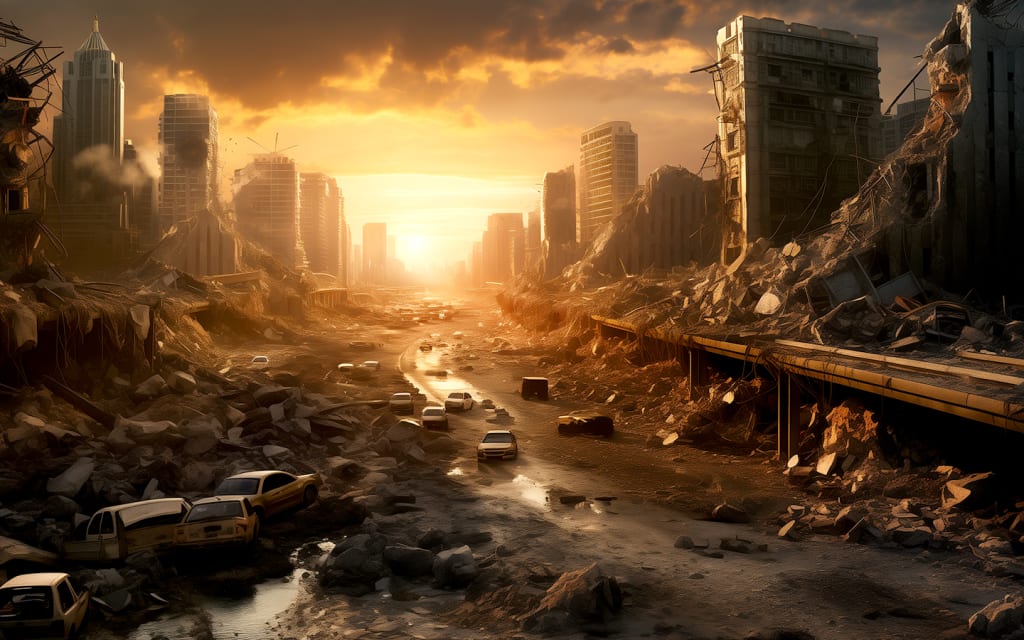On the Edge of Existence: Is Civilization Teetering on the Brink of Collapse?
Navigating the Precarious Balance Between Resilience and Ruins

At the zenith of its power, the Roman Empire stood as a testament to human ingenuity, hosting 30% of the global population. From advanced heating systems to pioneering banking, Rome exemplified technological prowess and economic might, creating an empire deemed unassailable—until it crumbled. Today, as our globalized civilization thrives, interconnectedness amplifies both its potential and vulnerability, raising the crucial question: Is civilization on the brink of collapse?
Unveiling the Fragility of Civilization: A Historical Lens
Civilization, defined by specialized labor, social classes, and institutional rule, births efficiency, knowledge, and innovation on a grand scale. Yet, history reveals that collapse is more the norm than the exception, occurring on average after 340 years. As we revel in modern marvels, from sprawling cities to advanced medicine, the specter of collapse looms, prompting an introspective exploration of our collective future.
While past collapses disrupted societies, humanity's resilience emerged triumphant. The Black Death's devastation, Hiroshima's destruction, and other tragedies witnessed recoveries that defy despair. Yet, with unprecedented destructive capabilities today, including nuclear arsenals and biotechnological risks, the stakes are higher. The potential for a global collapse prompts reflection on our ability to recover.
Optimism in the Face of Adversity: Factors Favoring Resilience
Optimism stems from our resilience, the likelihood of retaining crucial knowledge, and the adaptability of agricultural practices. Amidst potential chaos, the one billion agricultural workers today serve as a beacon of hope, ensuring that even if the global population fell drastically, survivors would possess the knowledge to produce food. Modern high-yield crops and the preservation of agricultural practices provide a foundation for recovery.
However, the challenge lies in rebuilding industrial capacity and overcoming dependencies on finite resources like coal. Our economies of scale, which rely on interconnected supply chains and intense demand, make it impossible to pick up where we left off. The risk of technological regression is imminent, underscoring the need for strategic planning and sustainable practices.
Mitigating Risks and Safeguarding Civilization: A Call to Action
Mitigating these risks requires proactive measures, akin to a civilization insurance policy. Decisions made today, such as ceasing the use of easily-accessible coal, can safeguard our ability to recover from a potential crisis. While post-collapse survivors may lose institutional knowledge stored on unreadable hard drives, the wealth of knowledge stored in the world's 2.6 million libraries provides a roadmap for rebuilding.
In a world where interconnectedness defines our existence, a global collapse could be catastrophic. With cities stretching thousands of square kilometers, sky-high travel capabilities, and instant communication, the collapse of the industrialized world would mean the demise of the majority of people alive today, as industrial agriculture becomes a lifeline for feeding billions. Moreover, the risk of a collapse so destructive that re-industrialization becomes impossible poses an existential threat, potentially depriving future generations of the chance to thrive as a multiplanetary species.
Navigating the Precarious Future: Toward a Resilient Civilization
In conclusion, the delicate dance between progress and peril underscores the imperative for collective action. The challenges we face demand a shared commitment to sustainable practices, strategic planning, and the preservation of knowledge. As we teeter on the edge of existence, it's our responsibility to transform the looming precipice into a platform for resilience. By embracing wisdom, foresight, and unity, we can chart a course toward a future where civilization not only endures but thrives in the face of adversity. In this pivotal moment, each decision we make ripples through time, shaping the narrative of generations yet to come. Let this be a rallying cry for a global ethos that values long-term sustainability over short-term gains, ensuring that our civilization becomes a beacon of resilience, transcending the challenges that once seemed insurmountable. The edge of existence, when met with courage and collaboration, becomes the vantage point from which we propel ourselves into a future defined not by collapse, but by the enduring strength of a united and resilient humanity.
About the Creator
Samiel Negash
I'm Samiel Negash, a passionate writer who educates and creates awareness on topics impacting lives. I strive to inspire personal growth through powerful storytelling.Join me on my journey of discovery and let's connect!





Comments
There are no comments for this story
Be the first to respond and start the conversation.